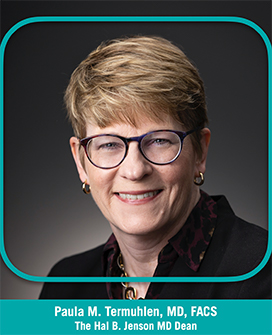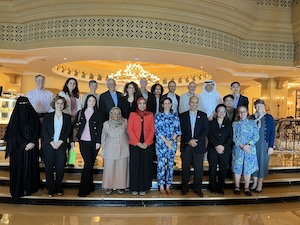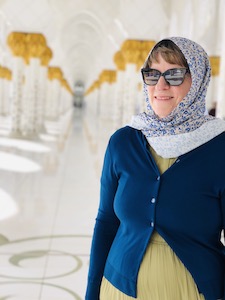
In this month’s installment of Dean Termuhlen’s Take On …, Dr. Paula Termuhlen discusses her February trip to Abu Dhabi in the United Arab Emirates (UAE) as part of the Accreditation Council for Graduate Medical Education International (ACGME-I).
 What can you tell us about your participation in ACGME International and the purpose of this trip?
What can you tell us about your participation in ACGME International and the purpose of this trip?
We know that, especially this time of year, our residency training programs are highly sought after. However, we may not always realize that those training programs are part of what helps us make sure we have highly qualified, highly trained outstanding physicians. The accreditation process, like what we’re going through for the medical school right now, is designed to ensure we have consistent standards. Part of the work that we get called to do in academic medicine is to participate in professional organizations to take care of patient care and safety in a wide variety of ways. In this instance, I had the opportunity to work with ACGME-I. I sit on the Surgical/Hospital-Based Review Committees International, a committee that helps to oversee the training programs that are hospital-based like emergency medicine, pathology, surgery, orthopaedic surgery, pediatric surgery, and radiology.
This arm of the ACGME was created because programs had the desire to have the same consistency and high-quality educational environments in their countries. We’re extending what we consider to be the most rigorous and high-quality learning environments to other places around the world at their invitation. Right now, this affiliate of the ACGME accredits programs in several countries.
I had the opportunity to go to Abu Dhabi in February as part of this committee. I experienced the culture and met my colleagues in-person who reside in the United Arab Emirates and other areas around the world where we have these ACGME International accredited programs. The committee includes physicians from Singapore, Qatar, Oman, the United States, and the UAE. Being able to experience the culture gives you great insight into what a learner might experience in their learning environment.

Why is it important for you to represent WMed on an international level in this way?
We have students, residents, faculty, and staff who do hands-on, front-line patient care work in a variety of places around the world. We’re exploring partnerships with medical schools in different areas around the world such as Europe, Asia, and South America because we know that there are different components of that global engagement – everything from direct patient care to helping to support the next generation of physicians around the world who will have the same kinds of experiences that our trainees in the United States have.
I’m able to represent WMed by taking my career experiences, with our WMed training programs and what our learners experience, and applying that to different cultures and settings around the world. We also learn a lot from our colleagues in different places around the world. Often, we’re working with physicians who were trained in the United States and want to have the opportunity to send their learners to the United States for fellowship training and be able to provide care back in their countries.
Can you give an example of a time when the residency review committee you serve on made a decision that affected international training programs?
I was one of the members on the ACGME residency review committee for surgery that approved programs for Pediatrics-Surgery, similar to how Medicine-Pediatrics is a combined specialty in the United States.
I worked with Iftikahr Ahmed Jan, the chief of pediatric surgery at Sheikh Shakhbout Medical City in Abu Dhabi, which is affiliated with the Mayo Clinic and Khalifa University. They wanted to create a new pediatric surgery residency straight out of medical school because the care of children there is really regionalized and somewhat sequestered to the children’s hospital. They wanted to focus on the care of children, while spending time with pediatricians and learning about child development in addition to learning the surgical diseases and components of pediatric surgery. They saw a need that was different than how we view that in the United States.
We work collaboratively in the care of patients around the world both by bringing our best experiences and learning about their best experiences.
On a personal level, what did you take away from this trip with ACGME-I?
One of the most professionally rewarding pieces for me has always been to work with like-minded professionals, wherever they may be, in service to our patients and our profession. I see this as an extension of that. On a personal level, it was an incredible learning experience to be able to go to Abu Dhabi in the United Arab Emirates. For years, in different parts of my career, I’ve had the chance to provide care for patients from the United Arab Emirates, particularly when I was in my training days at M.D. Anderson. To visit the country and to experience the culture was coming full circle around understanding my patients’ lived experiences. It’s really a privilege at this point of my career that I’m able to export some of our experiences to that country. It was interesting to learn a lot about what it means to live in that area, to see the investments in the infrastructure, and how they provide support for their citizens.
How does your experience with ACGME-I correlate with global engagement efforts at WMed?
The idea that we look at contributing to global engagement across the spectrum, everything from providing direct patient care to participating in the educational experiences of learners around the world, this is an example of that. We get the opportunity to learn from others and sometimes we can borrow innovations we’ve developed in the international space and utilize those in the United States.
A Hat Tip from Dr. T
I’d like to extend a special thanks to our core clerkship directors during Match month. They help our students get their core experiences. They are so essential to the work we do, and they play a really important role for our students in how they discern their specialties.
Dean Termuhlen’s Take On ... is a monthly message from our dean to discuss topics of importance to WMed, medical school stakeholders, and the communities that make up Southwest Michigan. Is there a topic you would like to hear Dean Termuhlen’s take on? Let us know by sending a message to office.dean@wmed.edu.
